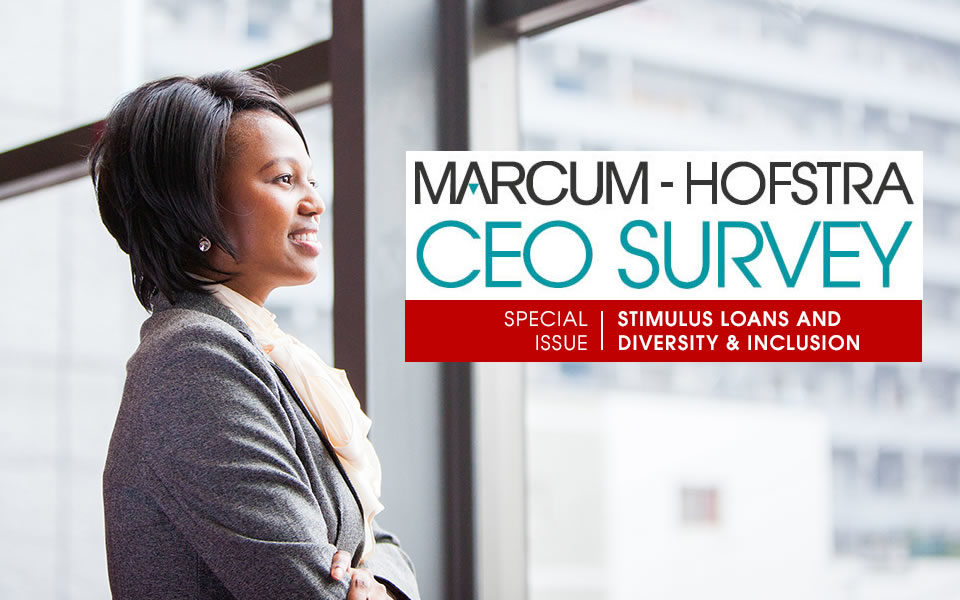CEOs Discuss Economic Stimulus and Racial Equality, in Marcum-Hofstra Survey
Snapshot of CEO Outlook as the COVID Economy Begins to Reopen
More than half of middle-market CEOs say increasing racial diversity and inclusion is a top priority, and plan to examine their companies’ policies in light of nationwide civil rights and social justice protests in recent months, according to the latest poll from Marcum LLP and Hofstra University’s Frank G. Zarb School of Business. Respondents also conveyed an overall economic outlook that has markedly declined from prior Marcum-Hofstra surveys.
The survey of 261 CEOs nationwide sought to uncover how mid-market companies are handling the simultaneous challenges of surviving in the COVID-19 economy amid increasing calls for racial equality. It was the third installment in the Marcum-Hofstra 2020 series. The previous poll, conducted at the start of the global pandemic, focused on production and supply chain issues related to COVID-19.
Economic Stimulus
Approximately 51% percent of mid-market CEOs said their businesses applied for economic stimulus loans under the Paycheck Protection Program and/or Main Street Lending Program, and 87% of those received them. Among companies receiving loans, 43% said they would have had to reduce staff and/or operating budgets without the stimulus funds. Four percent said they would not have been able to continue operating without a loan. Nearly half (49%) said they could have survived without making significant changes.
CEOs remarked on how the loans impacted their businesses:
- “Kept us afloat and helped meet payroll and keep most employees during quarantine; also aided in purchase of servers and data center improvements.”
- “We were able to weather the downturn and pivot using existing staff to realign our operations with positive cash flow initiatives.”
- “Has helped with expenses but won’t last long.”
- “It is helping me prepare for the future.”
Racial Diversity & Inclusion
As civil rights protests accelerated throughout the spring and summer, CEOs were challenged to consider the implications for their businesses. 54.8 percent of survey respondents said that increasing racial diversity and inclusion is a stated top strategic priority for their companies. 55.2 percent said they are considering their policies and procedures regarding racial diversity and inclusion in the workplace.
At companies where diversity and inclusion is not a stated priority, approximately 19 percent are considering their policies in these areas, and 31 percent anticipate doing so.
Comments from respondents on racial diversity and inclusion were varied:
- “It has definitely made these issues a higher priority and now we have executive buy-in and budgeting to allow the creation and implementation of a new companywide strategy.”
- “Our firm is making it a priority to retrain employees on diversity and empathy.”
- “Racial and social justice are important to our decision making because we believe it makes us a more considerate and ethical company.”
- “My company has never made any aspect reliant upon race or any other surface traits and I have absolutely no intention of starting now. My employees are here because they have the talent and capabilities needed. That is all that I care about.”
- “We have created an inclusion committee to explore various initiatives.”
- “Our company is fully integrated in the belief that we are all the same color with the lights off.”
Economic Outlook
The survey asked CEOs to rate their economic outlook on a scale of 1-10. CEOs who rated their economic outlook at the lowest end more than tripled to 22 percent, from seven percent in the prior survey. At the other end of the scale, those rating their outlook a 10 plummeted from 13.3 percent to 4.2 percent. Just 10.7 percent of CEOs selected a rating in the upper range of 8-10, a sharp decrease from 35.6 percent previously. The weighted average response of 4.23 compares to 7.72 in the first survey of 2020.
Economic concerns far outweighed other influences on business planning, with 39 percent of CEOs saying it is the most influential factor in their planning, and more than two-thirds saying it is a top 3 influence.
Marcum Chairman & Chief Executive Officer Jeffrey M. Weiner said, “This has been an extremely challenging year for CEOs, as economic and social forces converged. The Paycheck Protection and Main Street Lending Programs provided critical assistance to businesses to help mitigate the impact of the pandemic, and hopefully businesses will be able to hang on while Congress continues to debate whether to extend the programs and by how much. The civil rights protests came at the same time that the pandemic took hold, compelling many business leaders to consider how diversity and inclusion is internalized at their companies. Either of these issues would be significant on its own, but together they have really put a huge onus on the plate of our nation’s middle-market CEOs.”
This is the fifth installment of the Marcum-Hofstra poll, which launched in May 2019 and is being conducted as part of the Zarb School of Business MBA curriculum. The survey polls mid-market CEOs on a range of issues, including economic outlook, growth and investment plans, and specific policy and news developments.
This survey was developed and analyzed by a class of Hofstra MBA students led by Dr. Andrew Forman, associate professor of marketing and international business, in partnership with Marcum.
“Businesses are grappling with an unprecedented combination of economic and social challenges, and our students are quite literally helping to create the historical record of these extraordinary times,” said Zarb School Dean Janet Lenaghan. “I can’t think of a better way to learn about management, leadership and innovation.”
Said Dr. Forman: “The issues facing mid-market CEOs are the same issues that our students – that all of us – continue to navigate every day. I think that made this particular installment of the survey especially relevant, meaningful and instructive for our students.”
For the complete Marcum LLP-Hofstra University CEO Survey and an archive of prior surveys, visit https://www.marcumhofstraceosurvey.com.
About the Survey
C-suite executives at 261 companies participated in the Marcum LLP-Hofstra University CEO Survey. Participating industries included:
- Construction/Engineering/Mining
- Financial Services
- Government and Non-Profit
- Health Care (providers and payers)
- Manufacturing (consumer)
- Manufacturing (industrial)
- Online Retailing/E-Commerce
- Personal/Consumer Services
- Professional Services
- Real Estate
- Restaurants/Catering
- Retailing
- Technology Services
- Transportation
- Travel and Leisure
- Wholesale/Distribution
- Other
About the Frank G. Zarb School of Business at Hofstra University
Hofstra University’s Frank G. Zarb School of Business prepares students to become tomorrow’s global leaders. Located just 25 miles from New York City, Zarb students have access to internships and networking opportunities across every industry. The Zarb School combines entrepreneurial, hands-on learning and research with real-world experience and mentorship in state-of-the-art facilities, including a Behavioral Research in Business Lab, Center for Entrepreneurship, and academic trading room. Our undergraduate and graduate programs in accounting, management and entrepreneurship, marketing and international business, finance, and business analytics are ranked and recognized by US News & World Report, Princeton Review and Poets & Quants as among the best in the world. This survey was developed and analyzed by a class of Hofstra MBA students led by Dr. Andrew Forman, associate professor of marketing and international business, in partnership with Marcum. The questions reflected current issues of interest to CEOs of mid-sized companies. For more information, visit www.hofstra.edu/zarb.
About Marcum LLP
Marcum LLP is a top-ranked national accounting and advisory firm dedicated to helping entrepreneurial, middle-market companies and high net worth individuals achieve their goals. Marcum’s industry-focused practices offer deep insight and specialized services to privately held and publicly registered companies, and nonprofit and social sector organizations. The Firm also provides a full complement of technology, wealth management, and executive search and staffing services. Headquartered in New York City, Marcum has offices in major business markets across the U.S. and select international locations. #AskMarcum.




















